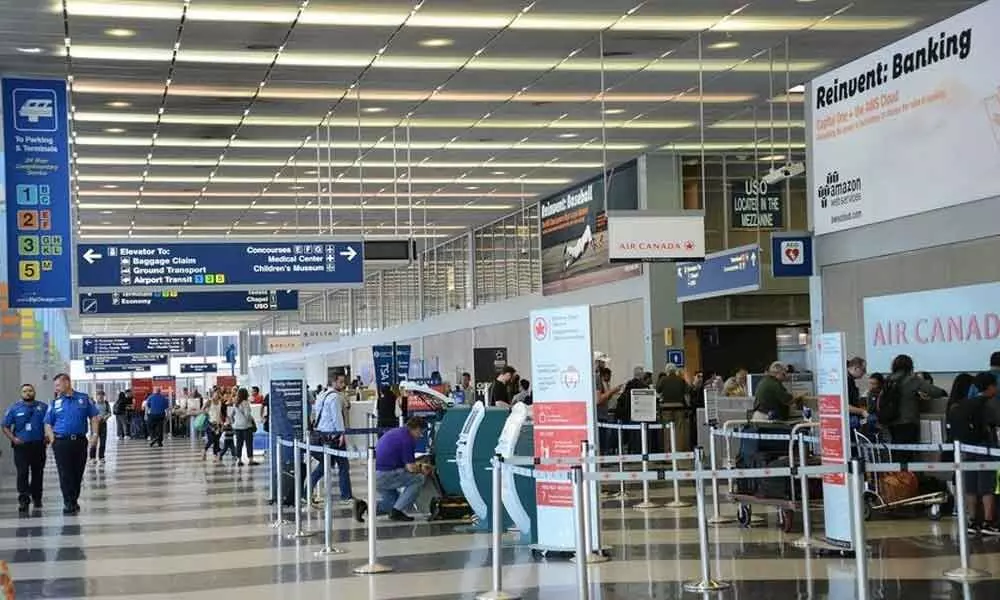Covid takes toll on airports

Covid takes toll on airports
Maintaining airport infrastructure a big financial challenge during these trying times, says APAO report
Mumbai: AIRPORT operators in India have suffered catastrophically from the ongoing Covid-19 outbreak in terms of its traffic base, revenues, and cash balance from March last year.
While the 1st wave of the pandemic had already wiped out traffic in FY21 denting the financials of the airports, the onset of the 2nd wave of Covid-19 has further compounded the crisis as domestic passenger traffic has dropped to less than 18- 25 per cent of pre-Covid levels.
Furthermore, international traffic, which is invariably the high yield segment for airports, has been suspended for the last 14 months (International traffic has dropped to 5–10 per cent of pre-Covid levels!) and there are no signs of restart of scheduled operations in near future, a report by Association of Private Airport Operators (APAO), an industry body of private airports in India, says.
In addition to this, the looming threat of the 3rd wave, which has been predicted to be inevitable by many experts including government bodies, indicates a muted traffic recovery even in FY22 and the traffic will barely reach the FY21 level, which itself was not adequate for financial survival of airports, it added.
Talking to Bizz Buzz Jitendra Bhargava, an aviation expert, said, "So far, the govt hasn't extended any support to the airport. Airports are getting low revenue from aeronautical side as there are very few flights taking off. They are not getting enough bob-aeronautical revenue as no visitor is coming at airport."
GS Bawa, another aviation expert, says, "Airports and airlines both are linked to each other. Because there are very few flights taking off, so is the worsening revenue earning of airports. Govt should provide all the support possible so as to ensure that flights resume and airports become operational in a full-fledged manner as early as possible."
Airports are asset intensive businesses with high sunk costs, disproportionate to the revenues generated and having long gestation periods.
Airports have to incur fixed costs for maintaining and operating airport infrastructure such as runways, taxiways, apron, parking bays, and terminal buildings etc. In airports, of the total costs incurred, 80-85 per cent of it is fixed costs.
So, while on one side revenues have dried up, on the other hand airports have to continue incurring high fixed costs.
Due to Covid-19, airports had to incur additional operating expenses as well as additional operational capex due to re-designing of infrastructure and SOPs for containment of Covid-19 and for processing of passengers in a safe and convenient manner.
Airports are not generating sufficient cash flows to sustain operations, and meet debt obligations. Poor cash flows and consequently downgraded credit ratings have made it impossible for airports to take further financing support from financial institutions, the report said.
As per the forecasts by international agencies, the global passenger traffic will not return to pre Covid-19 levels until 2023-24.
As per the rating agency ICRA, the airports in India are expected to witness a decline in operating income by 61 per cent to Rs 8,400 crore while reporting an operating loss of around Rs 1,700 crore (-20 per cent margin) and a net loss of Rs 5,400 crore (-64 per cent margin) in FY21. The overall cash loss for the sector is estimated at around Rs 3,500 crore in FY21, impacted by a 66 year-on-year slip in passenger traffic amid Covid-19 induced travel restrictions.
As the cash flow situation is precarious, airports have been requesting the government amidst an extremely challenging environment to provide some relief measures to the airport operators which will directly alleviate the financial burden for airports. Relief measures are required not only to ensure sustaining operations at airports, but also needed to save jobs and allow economic recovery of the airport sector.














